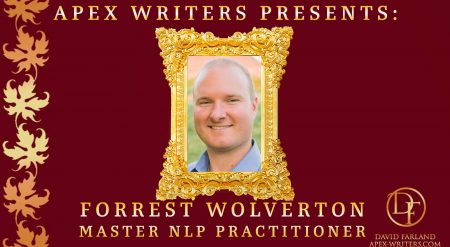Brainstorming a Scene
If you’ve been reading my previous posts this previous week, then you’ve learned now about increasing your brain power, finding motivation to put your butt in the chair, dreaming big, and getting into a creative mood. Now that we’re five days into NaNoWriMo, it’s time to start planning out your writing scenes for your book.
If you’d like more help in planning and outlining your book, I’ve created a course called “The Story Puzzle” which you can buy individually, or as a bundle on mystorydoctor.com. For those of you who want even more help to get motivated, come to apex-writers.com and join our writing group where we will be holding daily writing sprints where authors work together to create their novels, get individualized feedback, and grow stronger as a community together.
As a contest judge, I see a lot of stories from beginning writers, and very often the writer seems to be preoccupied with just “writing.” They let their imaginations take them where they will in a scene. So they tend to overwrite in one of several ways.
They may spend time exploring the nooks and crannies of a setting, or creating entire billion-year histories. They might spend time relaying relatively unimportant information about a characters’ inner motivations, or over-writing rather trivial dialog. They may spend time playing with words, trying simply to write beautiful metaphors or working to be witty, or simply just trying to capture a mood or tone.
The results can sometimes be surprising and a bit gratifying, but most often the scene feels bloated, overwritten.
In order to avoid bloat, I often have a list of things that I think about as I prepare to write a scene.
1.What’s The Purpose of The Scene?

For example, let’s say that I want to show that a character, let’s call him Derrick, is falling in love with Kate. How do I show that? I might decide that I want to create a moment when Derrick recognizes that she’s interesting. Maybe she says something that catches his attention—making an astute comment about people. He might think to himself, “Wow, there’s something different about this woman.” I might mention the aroma of her perfume, the translucence of her skin, or something else that attracts him. The point here is that I want to begin writing with a focus in mind, not wander around in a dragged-out conversation.
2. What Changes in the Scene?

A scene that doesn’t advance the story in some way should most likely be cut. It’s probably extraneous to the story. So I look at what changes in my scene, how it makes the story grow. In fact, I have to ask myself, is this integral to the story? Will the story still make sense if I don’t relate this scene? Of course, sometimes the fact that things don’t change is crucial. For example, in the Kazuo Ishiguro’s novel Remains of the Day, a butler sacrifices his soul for a rather foolish employer, foregoing the chances for love and happiness out of a mistaken sense of loyalty. Time and again, he has the chance to seize life by the throat—and fails. The results are both heartbreaking and instructive—and so each scene is logically justified.
3.I Ask Myself at The Start, “How Shall I ‘Set’ My Scene?”

In every scene, we need to describe where we are with the idea of transporting the reader into the scene—using all of the senses in order to bring the scene to life. This means that we need to let the reader know what is in the background, the middle-ground, and what is close at hand. As we do that, we also have to explain who is in the scene.
4. Next I Ask Myself, “Who Will Be My Viewpoint Character?”

Your character is the lens through which you relay the action. That means that you need to pick a viewpoint character, choosing him or her for good reasons. That normally means that you choose the one who is in the most pain, or the one who is struggling hardest to deal with a major problem, though you might also choose the character who has the most power to change the story. But you have to establish a character.
Since we as humans are each locked into our own consciousness, experiencing the world in our own way, your character should become the focal point for the reader’s experience. In other word, the reader should see the world through that character’s eyes, feel it through his skin, hear it through his ears. Since we are constantly thinking and feeling, you also need to relay the character’s thoughts and emotions. Many writers fail to do this well—they try to jump from one character’s consciousness to another for their own convenience as a storyteller, or—worse—they try to hide information from the reader in order to surprise them later.
5. Next, I Ask Myself, “How Will I Write This Scene Eloquently?”

In a first draft, I just try to get the action on paper. But let’s face it, telling a story well requires us to try to lift the story above the mundane. This might mean that as I write, I will embellish the description a bit in some surprising ways. I might consider the power and poetry of my language as I try to capture a character’s tone or the ambience of the setting. I might consider my dialog, asking myself how I can have characters struggle to be witty or profound. In short, there hundreds of little thing that I can do to make a scene beautiful, but they’re all just decoration.
Often, it’s only after I’ve written a scene well that I take the time to play with it, look for ways to impress the reader.
In short, writing a powerful scene isn’t something that just happens. You need to plan your scene well, then perfect it as your write it, and embellish it through the rewriting process.
Happy writing,
David Farland
P.S. keep reading to learn about some special guests coming soon to Apex Writers!
Forrest Wolverton is a Master NLP Practitioner and a frequent guest on Apex Writers. You can watch this and all other past recordings of Forrest on Apex as well as all our other past guests by going to https://www.apex-writers.com/
Michaelbrent Collings is an American horror novelist. He wrote the screenplays for two horror films: Barricade and Darkroom. He has self-published many novels, with two of his novels being finalists for the Bram Stoker Award in 2016, and two being finalists for the Whitney Awards in 2014 and 2017. He’ll be joining us on Monday evening at Apex.










